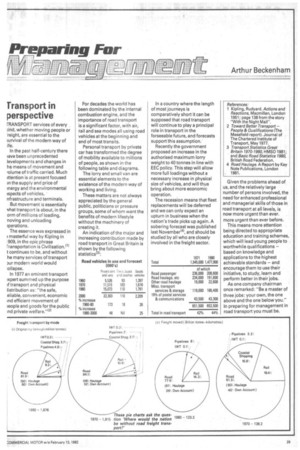Transport in perspective
Page 27

If you've noticed an error in this article please click here to report it so we can fix it.
TRANSPORT services of every cind, whether moving people or reight, are essential to the mrvival of the modern way of if e.
In the past half-century there lave been unprecedented levelopments and changes in he means of movement and olume of traffic carried. Much Mention is at present focused )n the supply and price of mew and the environmental ispects of vehicles, nfrastructure and terminals. But movement is essentially vhat transport is about, in the orm of millions of loading, moving and unloading )perations.
The essence was expressed in masterful way by Kipling in 909, in the epic phrase Transportation is Civilisation.111 t continues to be, and without he many services of transport )ur modern world would :ollapse.
In 1977 an eminent transport ixpert summed up the purpose if transport and physical listribution as: "the safe, eliable, convenient, economic ind efficient movement of ieople and goods for the public Ind private welfare."121
For decades the world has been dominated by the internal combustion engine, and the importance of road transport is a significant factor, with air, rail and sea modes all using road vehicles at the beginning and end of most transits.
Personal transport by private car has transformed the degree of mobility available to millions of people, as shown in the following table and diagrams.
The lorry and small van are essential elements to the existence of the modern way of working and living.
These matters are not always appreciated by the general public, politicians or pressure groups, some of whom want the benefits of modern lifestyle without the machinery of creating it.
An indication of the major and increasing contribution made by road transport in Great Britain is shown by the following statisticst3):
In a country where the length of most journeys is comparatively short it can be supposed that road transport will continue to play a principal role in transport in the forseeable future, and forecasts support this assumption.'
Recently the government proposed an increase in the authorised maximum lorry weight to 40 tonnes in line with EEC policy. This step will allow more full loadings without a necessary increase in physical size of vehicles, and will thus bring about more economic operation.
The recession means that fleet replacements will be deferred and we can only expect an upturn in business when the nation's trade picks up again. A sobering forecast was published last November(4), and should be studied by all who are closely involved in the freight sector.
Given the problems ahead of us, and the relatively large number of persons involved, the need for enhanced professional and managerial skills of those in road transport at all levels, is now more urgent than ever. more urgent than ever before.
This means more attention being directed to appropriate education and training schemes, which will lead young people to worthwhile qualifications — based on knowledge and applications to the highest achievable standards — and encourage them to use their initiative, to study, learn and perform better in their jobs.
As one company chairman once remarked: "Be a master of three jobs: your own, the one above and the one below you." In preparing for management in road transport you must be.
















































